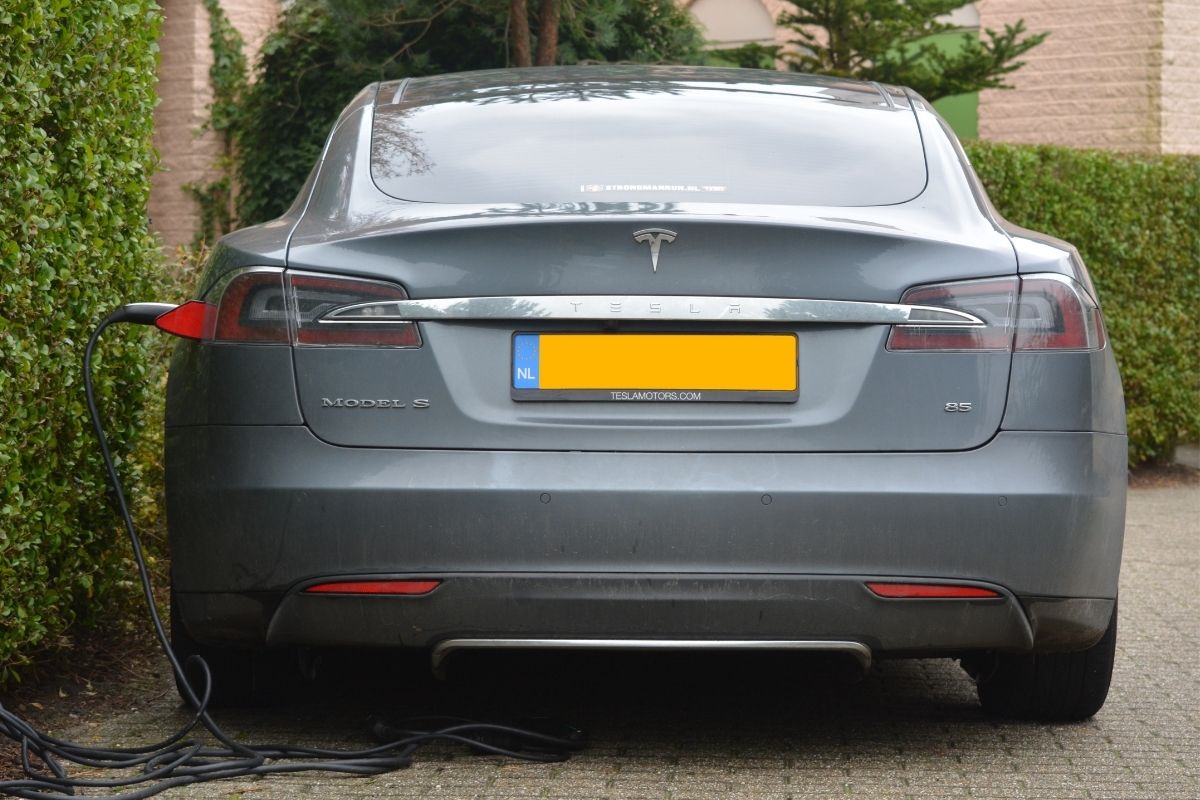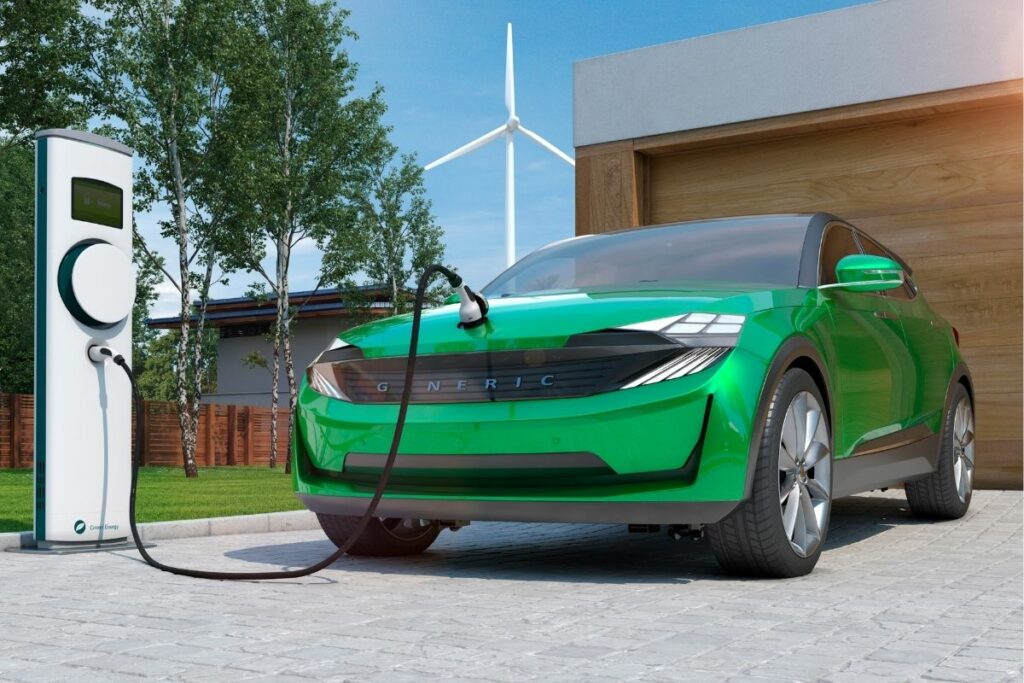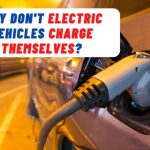Last Updated on March 18, 2022 by
Electric cars are becoming more common in our daily lives. They are cleaner, quieter, and more efficient than their gas counterparts and as such many people are switching over to either fully electric cars or hybrid versions of gas powered cars.
The reason for this is that electric vehicles (EV) are powered by electricity instead of gasoline.
Electricity can come from multiple different places, instead of fossil fuels, like wind power or hydroelectric plants, unlike gas powered cars which burn gas to create combustion, thus emitting harmful gasses into the air.

This makes them safer for us and the environment without sacrificing vehicle mobility.
Yet, for all the claims of clean, electric powered vehicles, it is hard to imagine their internal components as being far removed from actual cars.
Even if they are powered solely by a battery, surely other parts of the vehicle will need lubricants like oil to keep them moving, won’t they? In this article, we will look closely at electric cars and discover whether or not they need oil.
What is Motor Oil Used For in a Car?
First off, let’s discuss what exactly oil is used for. Oil is used to lubricate and cool engines, but also to make sure that your engine doesn’t seize up while you’re driving.
If you’ve ever had a problem with your car breaking down on the side of the road because it is overheating, then you know how important oil is to keeping your engine running smoothly.
Without oil, your engine would be unable to move, so you’d have no way to get home.
Oil isn’t just for cars, though, it is also used in everyday household appliances. For example, when you turn the tap on, there is oil inside the pipes that keeps water flowing through the system.
A washing machine uses oil to help its motor spin freely, and an oven needs oil to keep itself warm. So, it is incredibly useful to a lot of appliances.
Do Electric Cars Use Motor Oil?
Realistically, no. An electric car shouldn’t have a need for oil, due to the way it produces energy to move. See, a gas powered car uses a combustion engine, which relies on mechanical energy.
Mechanical energy is created in the car by the ignition of a combustion explosion which creates a kinetic force which is then used to push and power the vehicle.
The energy generated goes through and powers a lot of moving parts in a combustion engine: pistons, cylinders, bearings, valves, and more.
The constant movement of these heavy, metallic parts creates heat and friction, which wears away at their durability and ability to keep moving, eventually leading to the vehicle seizing up. Oil is used to lubricate these parts and prevent this, as a vehicle seizing means you need a new vehicle or engine.
Since the energy used to power an electrical vehicle is not produced by the engine itself, but stored in a battery for later use, there is no need to have moving parts that create or funnel the energy.
The car’s motor is powered by the battery, meaning less parts and less heat produced by the constant motion. Therefore, they have no need for motor oil.
Do Electric Cars Require Other Fluids?
Just because an electric car doesn’t need motor oil, does not mean they don’t need other fluids in the car or even other lubricants.
The electric car may run a little differently from the gas powered variety, but it is still a large piece of machinery, and it will have an abundance of specialist parts inside.

Brake Fluid
No matter the size of your vehicle, you will always need brakes. It doesn’t matter if you are driving a bike with training wheels on, the brakes should be present and working. This is doubly so with larger vehicles, and any braking mechanism in larger vehicles will use some sort of fluid when they are in use.
Brake fluid (or hydraulic fluid) is a non-compressible fluid that sits within the brake lines of a car. Once the brake is engaged by your foot, the brake fluid applies pressure to the brake rotors near the wheels, slowing down the car significantly or stopping it completely.
Electric cars don’t use the braking system as much as gas powered cars, due to the regenerative braking that kicks in when slowing the car to regenerate electricity and send it back to the batteries. However, brake fluid is still used regularly and is necessary for your vehicle.
Transmission Fluid
Gas powered cars have multiple gears that either the driver controls (manual) or the car controls (automatic).
These need to be lubricated regularly to stop seizing with motor oil. Yet, electric cars have only one gear that has a much higher RPM range, negating the need for a lubricant for the gears.
While this is the case, electric cars still have a transmission system, which transfers power from the engine to the wheels. As such, they need transmission fluid to keep them moving.
Battery Coolant
With a gas powered car, the engine would require coolant to make sure it and everything else inside the bonnet doesn’t overheat, but not necessarily the battery. In an electric car, this is reversed as the coolant is needed for the battery, as it is powering everything in the car.
If there is no coolant in your electric car’s battery, you run the risk of overheating and stalling your car or at worst making it catch alight, making this fluid one of the most important.
Do I Need to Change the Fluids in My Electric Car?
You will need to change the fluids in your electric car eventually. Everything eventually breaks down or stops functioning properly, and this includes the fluids in your car, unfortunately.
For those more familiar with gas powered cars, this can be a daunting task, and it is not one you should undertake alone. If you are unfamiliar with the cars, look online for advice or take your car to your dealership before experimenting.
How Often Should I Replace the Fluids in My Electric Car?
This depends on the fluid and the manufacturer of your vehicle. For common lubricants, like window cleaner or grease for suspension, either replace it when you run out or top it up after examining the area and seeing how it is doing.
For other fluids, it gets a bit more complicated. For brake fluids, it is recommended you get them changed as much as a regular car – every five years or so – as, even though they are used less in electric cars – you can not afford to have brakes that don’t work.
For transmission fluid, it should be replaced after the first year, and it should be done at a dealership.
For brake fluid, it depends on the car. With the Chevy Bolt, you should replace your battery fluid every 150,000 miles, but unfortunately for Teslas you may need to replace either the whole battery or the vehicle itself.
Is it Cheaper to Maintain an Electric Car Than a Gas Powered Car?
While the initial cost is higher for an electric car, it is definitely cheaper to maintain in the long run for two reasons:
Less Fluid
There are far fewer fluids to buy for your electric car, and the fluids that you do have to buy to run the car are mostly covered in either an annual checkup or are part of the warranty if you purchased it.
No More Gas
Gas prices are soaring due to the global climate and the scarcity of resources. However, due to the advent of renewable energy electricity prices are remaining relatively stable and for those with EV pumps at work, you don’t have to pay half the time. This is cheaper for you and your wallet.
There are probably many more reasons why electric cars are cheaper in the long run, but from these two reasons and these alone, you could save yourself a tidy sum.
Conclusion
Electric cars don’t need motor oil, because they don’t produce their own energy and therefore don’t produce the side effects of combustion which the moving parts of the car need to be protected from.
Therefore, if you are worrying about what fluids to buy for your car, don’t panic! They will be there, written in the handbook, but you can be sure motor oil is not one of them.
- Why Electric Vehicles Are Not Popular - January 29, 2023
- How Long Do Tesla Batteries Last Per Day? Battery Facts - January 25, 2023
- Do Electric Vehicles Have Air Conditioning? - December 21, 2022









